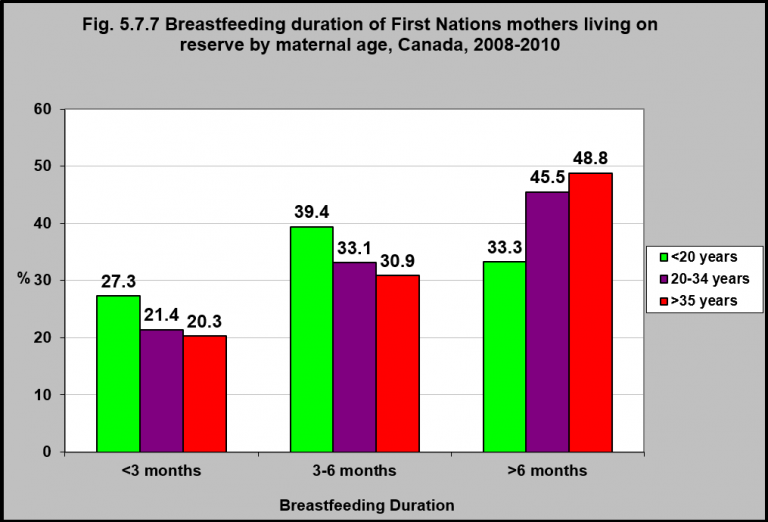Breastfeeding duration of First Nations mothers living on reserve by maternal age, Canada, 2008-2010

Source: CICH graphic created using data adapted from the First Nations Regional Longitudinal Health Survey (RHS) 2008/10, National report on adults, youth and children living in First Nations Communities. https://fnigc.ca/sites/default/files/docs/first_nations_regional_health_survey_rhs_2008-10_-_national_report.pdf -accessed August 22, 2017.
In 2008/2010, breastfeeding duration among First Nations women living on reserve increased with maternal age at birth.
Almost half of First Nations women living on reserve over 35 years of age breastfed for more than 6 months, whereas only one-third of women less than 20 years of age breastfed for more than 6 months.
Implications
Age has been associated with sustained breastfeeding, with older women more likely to sustain breastfeeding.1 This may be related to the presence of a support system. The increasing trend for babies to be born to cohabiting and unmarried parents or to single women suggests that younger women may not have the support of a spouse or partner which may be contributing to early breastfeeding cessation.2 Approaches to addressing these challenges are needed to facilitate supportive environments for prolonged breastfeeding in Indigenous communities.
1Gionet, L. (2013). Breastfeeding trends in Canada. Health at a Glance, November, 1-7; Best Start. (2014). Populations with lower rates of breastfeeding. Background information. Health Nexus. https://www.beststart.org/pdf/BCP-P2_Background%20Information_final.pdf -accessed October 7, 2017.
2Brand, E., Kothari, C., & Stark, M.A. (2011). Factors related to breastfeeding discontinuation between hospital discharge and 2 weeks postpartum. Journal of Perinatal Education, 20(1), 36-44; Thulier, D., & Mercer, J. (2009). Variables associated with breastfeeding duration. Journal of Obstetric, Gynecologic, and Neonatal Nursing, 38, 259-267.
